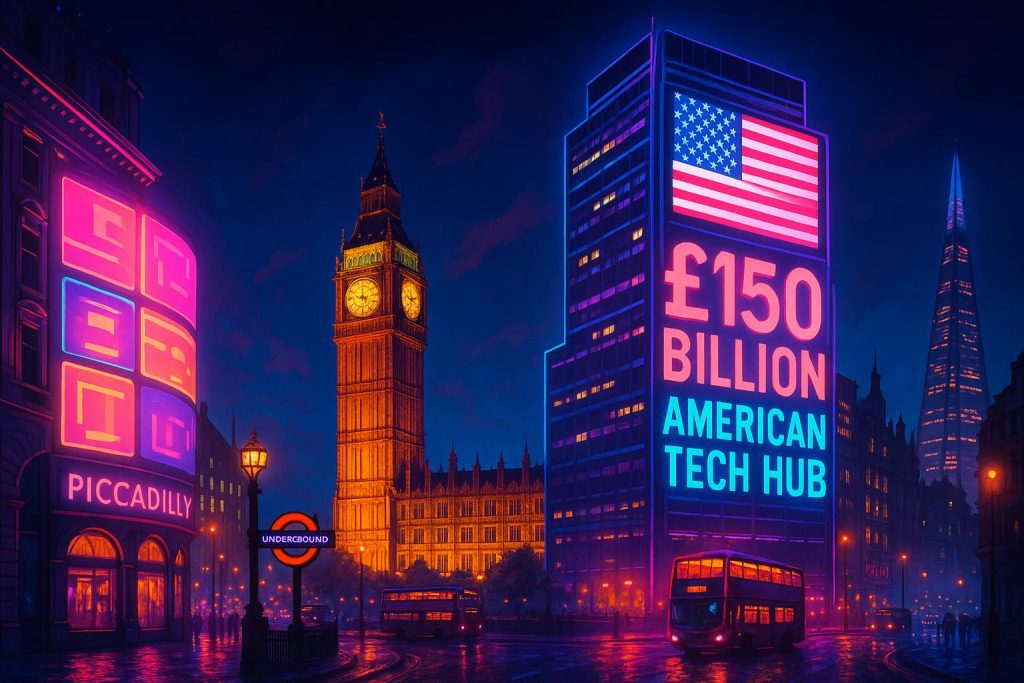Listen to the article
The UK secures a record £150 billion of investment commitments from US tech giants and firms, promising thousands of jobs amid a backdrop of sector challenges and political discussions at Chequers.
The UK government recently announced it has secured a substantial £150 billion worth of investment commitments from US companies, timed to coincide with President Trump’s state visit to Britain. This surge of investment pledges, made by notable players such as Microsoft, Google, and private equity giant Blackstone, is expected to generate approximately 7,600 new jobs across the UK. The government views these commitments as a strong endorsement of the UK’s economic resilience and openness to international business.
The lion’s share of this investment—£90 billion—comes from Blackstone, which intends to deploy these funds over the next decade. This is in addition to previous announcements by Blackstone, including a £10 billion commitment to build one of Europe’s largest artificial intelligence data centres in the North East of England, projected to create 4,000 jobs. Microsoft has pledged £22 billion to be invested over four years, which includes ambitions to construct the UK’s largest supercomputer, underscoring the country’s growing prominence in artificial intelligence. Google plans to invest £5 billion over two years to expand its data centre in Hertfordshire, creating over 8,000 jobs annually, while other tech firms like Nvidia and OpenAI are also committing significant resources to fortify the UK’s AI infrastructure.
Beyond the tech sector, Prologis, a real estate investment trust, is positioning to invest £3.9 billion in life sciences and advanced manufacturing, aiming to drive innovation and growth in these critical industries. Defence and engineering firms are also part of the investment wave; Palantir is allocating up to £1.5 billion towards UK defence innovation with plans for 350 new jobs, Boeing is resuming the conversion of military aircraft in Birmingham for the US Air Force—a first in over 50 years potentially adding 150 high-skilled jobs—and engineering firm STAX is committing up to £38 million to expand UK operations. Meanwhile, US company Amentum anticipates creating over 3,000 jobs, expanding its UK workforce significantly.
However, this influx of investment occurs against a challenging backdrop. The UK has seen a net loss of approximately 127,000 people from payrolls over the year to August, according to Office for National Statistics data. More critically, the life sciences sector has recently faced setbacks. Pharmaceutical giants Merck and AstraZeneca have scaled back or paused planned investments. Merck reversed a £1 billion investment plan, citing insufficient government support for innovative medicines and shifting research back to the US. AstraZeneca halted a £200 million investment in Cambridge, which was supposed to create 1,000 jobs, and had already scrapped a £450 million vaccine facility investment citing ongoing reassessment of business conditions and reduced UK government backing. Despite these setbacks, AstraZeneca has announced plans to directly list shares on the New York Stock Exchange to tap into deeper US capital markets but reinforced its commitment to maintaining its UK headquarters and London Stock Exchange listing, signaling ongoing ties to the UK.
This mixed picture underscores both the promise and current difficulties within the UK investment climate. On one hand, the historic £150 billion from US firms is expected to revitalise sectors such as artificial intelligence, clean energy, life sciences, and advanced manufacturing, aligning with the UK government’s Modern Industrial Strategy. On the other hand, the retreat of major pharmaceutical investments highlights concerns over policy and support for innovation sectors.
At Chequers, the prime minister’s country residence, UK and US investors, alongside Prime Minister Keir Starmer and President Trump, are set to discuss deeper economic collaboration. Starmer described the wave of investments as a “testament to Britain’s economic strength and a bold signal that our country is open, ambitious, and ready to lead,” emphasising the government’s intent to leverage these commitments for sustained economic growth.
While these pledges signal a potential upswing in US-UK economic ties, the full impact will depend on how these investments translate into tangible job creation and whether ongoing challenges in sectors like life sciences can be addressed to prevent further capital flight.
📌 Reference Map:
- Paragraph 1 – [1], [2]
- Paragraph 2 – [1], [2], [3], [6], [7]
- Paragraph 3 – [1], [2], [7]
- Paragraph 4 – [1], [2], [5], [4]
- Paragraph 5 – [1], [2], [5], [4]
Source: Noah Wire Services



